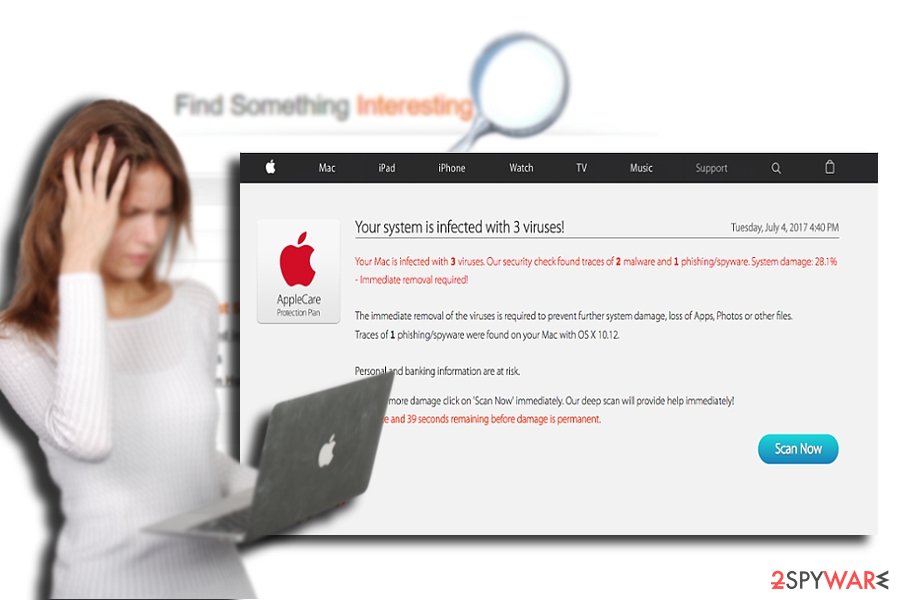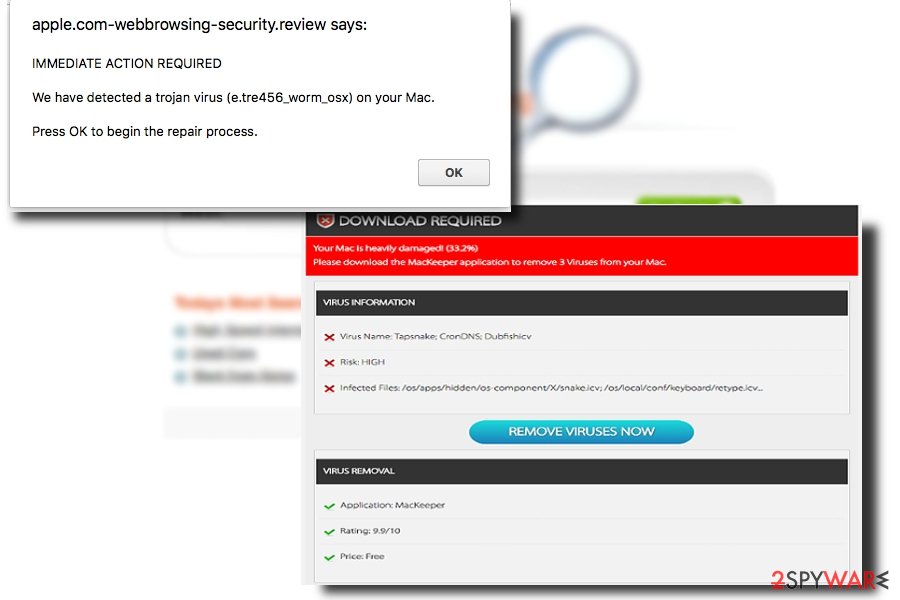Searchingresult.com (Removal Guide) - May 2019 update
Searchingresult.com Removal Guide
What is Searchingresult.com?
Searchingresult.com – a fake search engine that exposes you to unwanted ads

Searchingresult.com is the potentially unwanted program that is promoted as the high-experience Internet search engine Unfortunately, there is not much useful about this app. The program has been actively promoted as a better alternative to your default search engine and the application which is ready to help you “find something interesting.”
However, in reality, it is just another untrustworthy search site which has been added to “browser hijackers” category.[1] Beware that this program has been actively promoting questionable security programs by showing people fake scanners and virus-related notifications.
Additionally to those hijacking features, the app can employ adware-like behavior. This is a common feature for potentially unwanted programs because all of those applications are related to advertisers that need to generate views and pay-per-click revenue.[2] Fort hat, PUPs can track and collect information about you and your browsing preferences, including most viewed sites and searched items. Details as such later on get used in malvertising campaigns.[3]
| Name | Searchingresult.com |
|---|---|
| Type | Potentially unwanted program |
| Symptoms | Redirects online traffic, changes browser settings, delivers commercial content, causes sluggishness |
| Possible danger | Tracks and collects information about the user, installs other unwanted programs |
| Distribution | Software bundling, deceptive commercial content, pop-up ads |
| Elimination | Use antivirus tools or manual removal guide below to uninstall all the PUPs from your machine |
| System fix | After virus removal, use FortectIntego to clean your web browsers and fix damaged system files automatically |
You can install a potentially unwanted application as an optional component of free software, so there is no surprise why there are so many people who have been reporting about the infiltration of this malware. Once there, it takes over the browser by changing the start page and the default search engine and starts initiating redirects to sponsored websites. Such and similar search providers are distributed on the Internet with one main intention – to promote questionable tools or websites.
This malicious search engine can be added to all web browsers, including Google Chrome, Mozilla Firefox, Internet Explorer and Safari. If you have been suffering from Searchingresult.com redirect problem, our advice would be not to browse the net until you reset previous browser's settings. Otherwise, you can be redirected to a malicious website, such as apple.com-web browsing-security.review. Make sure you leave these domains ASAP to protect your computer from viruses.
A browser hijacker can perform additional changes on the machine to keep running and causing more frustration. Common symptoms of such PUP include:
- commercial pop-ups, pop-unders, banners, and in-text links filling sites that you are visiting;
- each click on the pop-up or banner redirects to questionable pages;
- homepage, new tab preferences set to Searchingresult.com;
- other web browser content gets installed on the machine.
Another issue related to this virus is that it enters computers along with tracking cookies. These minor elements are used to accumulate people's search terms, websites that they like the most, details that they enter, clicks, computer's IP address, its location, and similar information.

If you web browsers have been hijacked, we highly recommend you to check your computer with a decent anti-malware and remove this hijacker from the system right away. You should rely on the professional tool and get rid of all associated programs using antivirus tool like SpyHunter 5Combo Cleaner.
You need a full system scan for Searchingresult.com removal because there are many other programs running in the background that affect the persistence of this browser hijacking software. During the automatic malware check on your computer, all potential threats can be deleted.
Make sure to remove suspicious browser extensions, tools and toolbars from your browser. PUP install such content without your permission, so you need to uninstall them manually. We also have a few tips down below that should help to change browser settings back to default.

Software installers include optional programs
You can let this untrustworthy search provider to your computer yourself when downloading freeware without checking its optional components. Various potentially unwanted program developers have been using this distribution technique together with freeware providers when they pack other viruses and annoying apps with software.
To avoid them, you have to be extremely careful when installing free programs on your computer. Potentially unwanted programs, adware and browser hijackers, have been actively promoted together with download managers, media players, games, and similar freeware. That's why it's very important to check free programs before installing them.
To protect yourself, make sure you always read EULA, Privacy Policy, and other relevant information because it can disclose suspicious activities the freeware is involved in. In addition to that, users are recommended selecting Advanced or Custom installation option and deselecting checkboxes that claim:
“I want to set searchingresult.com as my default search engine” or I want to make this search engine my start page.”
Make sure that you opt out of such options to protect your computer!
Eliminate unwanted browser extensions from your web browsers
To remove Searchingresult.com from Windows or Mac OS X, you need to get rid of all components related to this browser hijacker. It includes executable files, browser helper objects, and similar components. If this browser hijacker took your system without your permission asked, we also recommend scanning it with the reputable anti-spyware program.
Keep in mind that this hijacker has been spreading via software packages. Also, make sure you remember about suspicious programs that it has been spreading around. There is no doubt that you must take care of PUP elimination as soon as possible. To remove it manually, you can use the following guide.
You may remove virus damage with a help of FortectIntego. SpyHunter 5Combo Cleaner and Malwarebytes are recommended to detect potentially unwanted programs and viruses with all their files and registry entries that are related to them.
Getting rid of Searchingresult.com. Follow these steps
Uninstall from Windows
Instructions for Windows 10/8 machines:
- Enter Control Panel into Windows search box and hit Enter or click on the search result.
- Under Programs, select Uninstall a program.

- From the list, find the entry of the suspicious program.
- Right-click on the application and select Uninstall.
- If User Account Control shows up, click Yes.
- Wait till uninstallation process is complete and click OK.

If you are Windows 7/XP user, proceed with the following instructions:
- Click on Windows Start > Control Panel located on the right pane (if you are Windows XP user, click on Add/Remove Programs).
- In Control Panel, select Programs > Uninstall a program.

- Pick the unwanted application by clicking on it once.
- At the top, click Uninstall/Change.
- In the confirmation prompt, pick Yes.
- Click OK once the removal process is finished.
Delete from macOS
Remove items from Applications folder:
- From the menu bar, select Go > Applications.
- In the Applications folder, look for all related entries.
- Click on the app and drag it to Trash (or right-click and pick Move to Trash)

To fully remove an unwanted app, you need to access Application Support, LaunchAgents, and LaunchDaemons folders and delete relevant files:
- Select Go > Go to Folder.
- Enter /Library/Application Support and click Go or press Enter.
- In the Application Support folder, look for any dubious entries and then delete them.
- Now enter /Library/LaunchAgents and /Library/LaunchDaemons folders the same way and terminate all the related .plist files.

Remove from Microsoft Edge
Delete unwanted extensions from MS Edge:
- Select Menu (three horizontal dots at the top-right of the browser window) and pick Extensions.
- From the list, pick the extension and click on the Gear icon.
- Click on Uninstall at the bottom.

Clear cookies and other browser data:
- Click on the Menu (three horizontal dots at the top-right of the browser window) and select Privacy & security.
- Under Clear browsing data, pick Choose what to clear.
- Select everything (apart from passwords, although you might want to include Media licenses as well, if applicable) and click on Clear.

Restore new tab and homepage settings:
- Click the menu icon and choose Settings.
- Then find On startup section.
- Click Disable if you found any suspicious domain.
Reset MS Edge if the above steps did not work:
- Press on Ctrl + Shift + Esc to open Task Manager.
- Click on More details arrow at the bottom of the window.
- Select Details tab.
- Now scroll down and locate every entry with Microsoft Edge name in it. Right-click on each of them and select End Task to stop MS Edge from running.

If this solution failed to help you, you need to use an advanced Edge reset method. Note that you need to backup your data before proceeding.
- Find the following folder on your computer: C:\\Users\\%username%\\AppData\\Local\\Packages\\Microsoft.MicrosoftEdge_8wekyb3d8bbwe.
- Press Ctrl + A on your keyboard to select all folders.
- Right-click on them and pick Delete

- Now right-click on the Start button and pick Windows PowerShell (Admin).
- When the new window opens, copy and paste the following command, and then press Enter:
Get-AppXPackage -AllUsers -Name Microsoft.MicrosoftEdge | Foreach {Add-AppxPackage -DisableDevelopmentMode -Register “$($_.InstallLocation)\\AppXManifest.xml” -Verbose

Instructions for Chromium-based Edge
Delete extensions from MS Edge (Chromium):
- Open Edge and click select Settings > Extensions.
- Delete unwanted extensions by clicking Remove.

Clear cache and site data:
- Click on Menu and go to Settings.
- Select Privacy, search and services.
- Under Clear browsing data, pick Choose what to clear.
- Under Time range, pick All time.
- Select Clear now.

Reset Chromium-based MS Edge:
- Click on Menu and select Settings.
- On the left side, pick Reset settings.
- Select Restore settings to their default values.
- Confirm with Reset.

Remove from Mozilla Firefox (FF)
To fix Firefox browser, you should reset it or remove all extensions that could be related to this browser hijacker.
Remove dangerous extensions:
- Open Mozilla Firefox browser and click on the Menu (three horizontal lines at the top-right of the window).
- Select Add-ons.
- In here, select unwanted plugin and click Remove.

Reset the homepage:
- Click three horizontal lines at the top right corner to open the menu.
- Choose Options.
- Under Home options, enter your preferred site that will open every time you newly open the Mozilla Firefox.
Clear cookies and site data:
- Click Menu and pick Settings.
- Go to Privacy & Security section.
- Scroll down to locate Cookies and Site Data.
- Click on Clear Data…
- Select Cookies and Site Data, as well as Cached Web Content and press Clear.

Reset Mozilla Firefox
If clearing the browser as explained above did not help, reset Mozilla Firefox:
- Open Mozilla Firefox browser and click the Menu.
- Go to Help and then choose Troubleshooting Information.

- Under Give Firefox a tune up section, click on Refresh Firefox…
- Once the pop-up shows up, confirm the action by pressing on Refresh Firefox.

Remove from Google Chrome
Delete malicious extensions from Google Chrome:
- Open Google Chrome, click on the Menu (three vertical dots at the top-right corner) and select More tools > Extensions.
- In the newly opened window, you will see all the installed extensions. Uninstall all the suspicious plugins that might be related to the unwanted program by clicking Remove.

Clear cache and web data from Chrome:
- Click on Menu and pick Settings.
- Under Privacy and security, select Clear browsing data.
- Select Browsing history, Cookies and other site data, as well as Cached images and files.
- Click Clear data.

Change your homepage:
- Click menu and choose Settings.
- Look for a suspicious site in the On startup section.
- Click on Open a specific or set of pages and click on three dots to find the Remove option.
Reset Google Chrome:
If the previous methods did not help you, reset Google Chrome to eliminate all the unwanted components:
- Click on Menu and select Settings.
- In the Settings, scroll down and click Advanced.
- Scroll down and locate Reset and clean up section.
- Now click Restore settings to their original defaults.
- Confirm with Reset settings.

Delete from Safari
Remove unwanted extensions from Safari:
- Click Safari > Preferences…
- In the new window, pick Extensions.
- Select the unwanted extension and select Uninstall.

Clear cookies and other website data from Safari:
- Click Safari > Clear History…
- From the drop-down menu under Clear, pick all history.
- Confirm with Clear History.

Reset Safari if the above-mentioned steps did not help you:
- Click Safari > Preferences…
- Go to Advanced tab.
- Tick the Show Develop menu in menu bar.
- From the menu bar, click Develop, and then select Empty Caches.

After uninstalling this potentially unwanted program (PUP) and fixing each of your web browsers, we recommend you to scan your PC system with a reputable anti-spyware. This will help you to get rid of Searchingresult.com registry traces and will also identify related parasites or possible malware infections on your computer. For that you can use our top-rated malware remover: FortectIntego, SpyHunter 5Combo Cleaner or Malwarebytes.
How to prevent from getting browser hijacker
Access your website securely from any location
When you work on the domain, site, blog, or different project that requires constant management, content creation, or coding, you may need to connect to the server and content management service more often. The best solution for creating a tighter network could be a dedicated/fixed IP address.
If you make your IP address static and set to your device, you can connect to the CMS from any location and do not create any additional issues for the server or network manager that needs to monitor connections and activities. VPN software providers like Private Internet Access can help you with such settings and offer the option to control the online reputation and manage projects easily from any part of the world.
Recover files after data-affecting malware attacks
While much of the data can be accidentally deleted due to various reasons, malware is one of the main culprits that can cause loss of pictures, documents, videos, and other important files. More serious malware infections lead to significant data loss when your documents, system files, and images get encrypted. In particular, ransomware is is a type of malware that focuses on such functions, so your files become useless without an ability to access them.
Even though there is little to no possibility to recover after file-locking threats, some applications have features for data recovery in the system. In some cases, Data Recovery Pro can also help to recover at least some portion of your data after data-locking virus infection or general cyber infection.
- ^ Understanding browser hijackers. Heimdal Security blog.
- ^ Pay-per-click. Wikipedia. The free encyclopedia.
- ^ Catalin Cimpanu. Malvertising campaign abuses Chrome for iOS bug to target iPhone users. ZDNet. Technology news.
- ^ What Is PII, non-PII, and Personal Data?. Piwik.pro blog.























